Related Research Articles
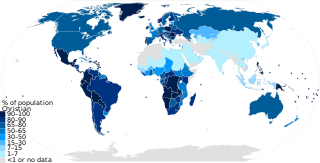
Christendom refers to Christian states, Christian-majority countries or countries in which Christianity is dominant or prevails.

The Crimean War was fought from October 1853 to February 1856 between the Russian Empire and an ultimately victorious alliance of the Ottoman Empire, France, the United Kingdom, and Sardinia-Piedmont.

Philip Schaff was a Swiss-born, German-educated Protestant theologian and ecclesiastical historian, who spent most of his adult life living and teaching in the United States.
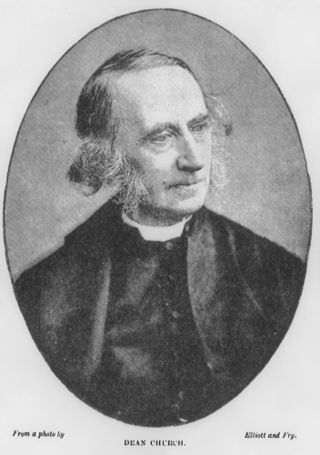
Richard William Church was an English churchman and writer, known latterly as Dean Church. He was a close friend of John Henry Newman and allied with the Tractarian movement. Later he moved from Oxford academic life to some prominence in the Church of England.
War against Islam is a term used to describe a concerted effort to harm, weaken or annihilate the societal system of Islam, using military, economic, social and cultural means, or means invading and interfering in Islamic countries under the pretext of the war on terror, or using the media to create a negative stereotype about Islam. The alleged perpetrators are non-Muslims, particularly the Western world and "false Muslims", in collusion with political actors in the Western world. While the themes of the "War against Islam" mostly concern general issues of societal transformations in modernization and secularization as well as current international power politics, the Crusades are often given as its starting point.

William Henry Cavendish-Scott-Bentinck, 4th Duke of Portland,, styled Marquess of Titchfield until 1809, was a British politician who served in various positions in the governments of George Canning and Lord Goderich.

Sir George Arthur, 1st Baronet was Lieutenant Governor of British Honduras from 1814 to 1822 and of Van Diemen's Land from 1824 to 1836. The campaign against Aboriginal Tasmanians, known as the Black War, occurred during this term of office. He later served as Lieutenant Governor of Upper Canada from 1838 to 1841, and Governor of Bombay from 1842 to 1846.
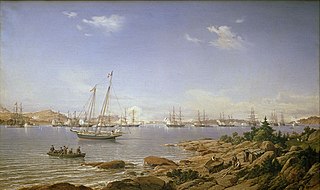
The Battle of Bomarsund, in August 1854, took place during the Åland War, which was part of the Crimean War, when an Anglo-French expeditionary force attacked a Russian fortress. It was the only major action of the war to take place at Bomarsund in the Baltic Sea.

Christendom College is a Roman Catholic liberal arts college founded in 1977 in Front Royal, Virginia, United States, located in the Shenandoah Valley.

Warren Hasty Carroll was the founder and first president of Christendom College in Front Royal, Virginia. He authored multiple works of Roman Catholic church history.
Johann (Hans) Schiltberger was a German traveller and writer. He was born of a noble family, probably at Hollern near Lohhof halfway between Munich and Freising.
The Seven Champions of Christendom is an epithet referring to St. George, St. Andrew, St. Patrick, St. Denis, St. James Boanerges, St. Anthony the Lesser, and St. David. They are the patron saints of, respectively, England, Scotland, Ireland, France, Spain, Portugal, and Wales.
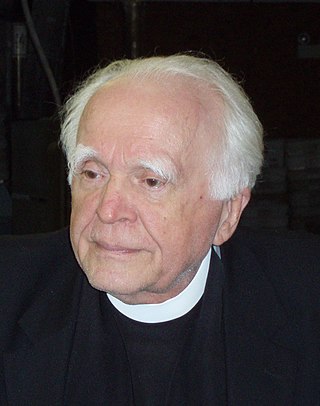
Stanley L. Jaki was a Hungarian-born priest of the Benedictine order. From 1975 to his death, he was Distinguished University Professor at Seton Hall University, in South Orange, New Jersey.
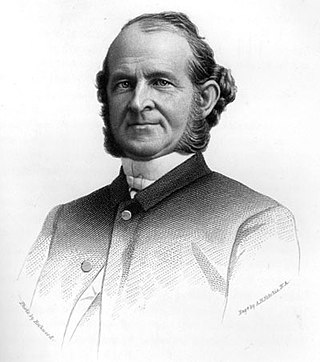
George David Cummins was an American Anglican Bishop and founder of the Reformed Episcopal Church.
Arthur Lillie, was a Buddhist, soldier in the British Indian Army, and a writer.
Frederick George Lee was a priest of the Church of England and a religious author. He co-founded the Order of Corporate Reunion.
Events from the year 1854 in the United States.

Jacob Peter Mynster was a Danish theologian and clergy member of the Church of Denmark. He served as Bishop of the Diocese of Zealand from 1834 until his death.

Boston Cemetery is a cemetery located in Boston, Lincolnshire in England. The cemetery dates back to 1855 and was laid out by Darlington architect James Pigott Pritchett junior.

The Lancaster Gate Memorial Cross is a grade II listed war memorial in Lancaster Gate, London, commemorating residents of the Metropolitan Borough of Paddington who died fighting in the First World War.